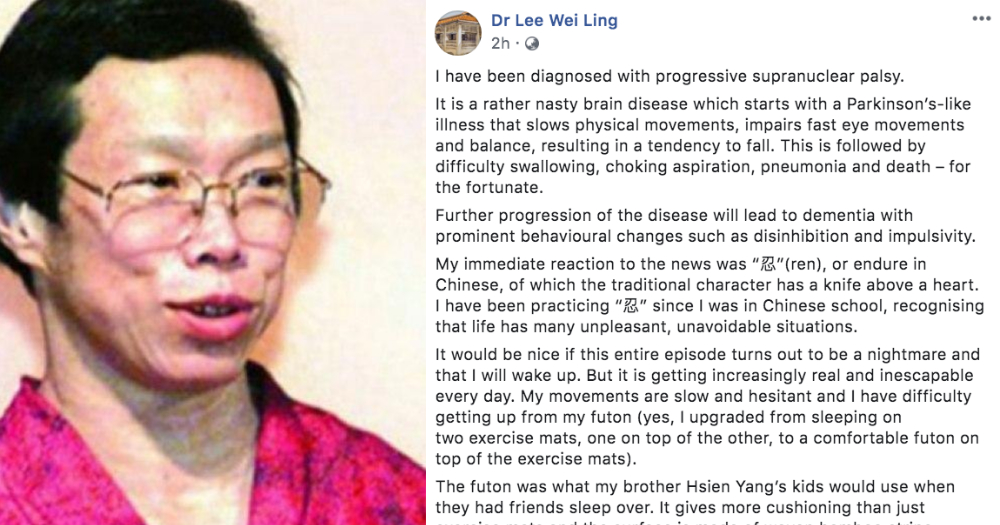On the night of Aug. 8, Lee Wei Ling, the daughter of the late Lee Kuan Yew, revealed in a Facebook post that she has been diagnosed with a rare brain disorder.
Lee suffers from progressive supranuclear palsy
Lee, a 65-year-old neurologist, said that she has progressive supranuclear palsy (PSP). She described the rare illness as a "rather nasty brain disease", which shares similar symptoms as Parkinson's Disease.
In the earlier stages of the disease, it will slow her physical movements, impair her eye movements, and affect her sense of balance. It might eventually lead to difficulty in swallowing, pneumonia and death.
As the disease progresses, she will also lose self-control on how she behaves and responds to others.
Lee said that she chooses to endure what has happened to her, even as she remarked that "it would be nice" if this could be just a "nightmare" that she could wake up from.
However, she is already experiencing slowness and difficulty in simple movements.
"It would be nice if this entire episode turns out to be a nightmare and that I will wake up. But it is getting increasingly real and inescapable every day. My movements are slow and hesitant and I have difficulty getting up from my futon (yes, I upgraded from sleeping on two exercise mats, one on top of the other, to a comfortable futon on top of the exercise mats)."
Here's Lee's Facebook post in full:
Earlier in May, Lee also said that she has been suffering from acute retention of urine for more than 13 years.It is an inability to voluntarily pass urine that can happen suddenly, gets worse quickly and lasts a short time, she added.
More about progressive supranuclear palsy
The cause of PSP is still not known, and there is no known cure for it yet. However, it could partly be genetic, according to recent studies.
However, the disease rarely occurs in the family and a genetic link is still unclear, according to Mayo Clinic.
It occurs more often in men than women.
Physical, occupational and speech therapies are used to manage the symptoms.
According to a neurologist at Mayo Clinic, Bradley Boeve, the onset of the disease usually comes when the patient is in his or her 50s or 60s.
Boeve also added that it takes about two to seven years from onset to passing for PSP patients.
The time from the onset of the disease to death usually takes two to seven years. According to the National Organisation for Rare Disorders in the U.S., PSP is estimated to affect about five in 100,000 people.
However, the disease is under-diagnosed.
Top image from Lee Wei Ling's Facebook page.
If you like what you read, follow us on Facebook, Instagram, Twitter and Telegram to get the latest updates.
